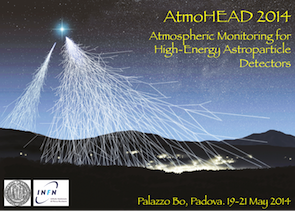Speaker
Ms
Guadalupe Saez Cano
(Space and Astroparticle Group, UAH, Madrid)
Description
JEM-EUSO is a space-based telescope which will detect Ultra High Energy Cosmic Rays (UHECR) and Extremely High Energy Cosmic Rays (EHECR) using the atmosphere as a calorimeter. It will be located at the International Space Station (ISS), and will look down to the atmosphere. To estimate the energy and arrival direction of the UHECR & EHECR as well as its primary composition, the UV light profile from EAS is needed to be measured. The observed profile depends on atmospheric conditions such as the clouds top height. Unlike stationary observatories on the ground, the JEM-EUSO space telescope traverses above various atmospheric situations within its large observation area. To characterize the properties of the atmosphere, the JEM-EUSO space mission comprises an Atmospheric Monitoring System (AMS) with an infrared camera and a LIDAR. As the scientific requirement of this project is to retrieve the clouds height and not the brightness temperature of the clouds it is mandatory to develop an effective radiative retrieval algorith that retrieves directly the height of the cloud avoiding any indirect approach that do not retrieve the cloud height and therefore increasing the contribution to the NETD Budget of the Infrared camera. Therefore, a novel radiative retrieval algorith that seems to be the most promising to achieve the Infrared camera scientific requirement, i.e., to retrieve directly the cloud top height is presently under development, taking into account the LIDAR shots as calibration points in the FoV of the infrared camera image.
Author
Ms
Guadalupe Saez Cano
(Space and Astroparticle Group, UAH, Madrid)
Co-author
Prof.
Maria Rodriguez Frias
(Space and Astroparticle Group. UAH Madrid)

